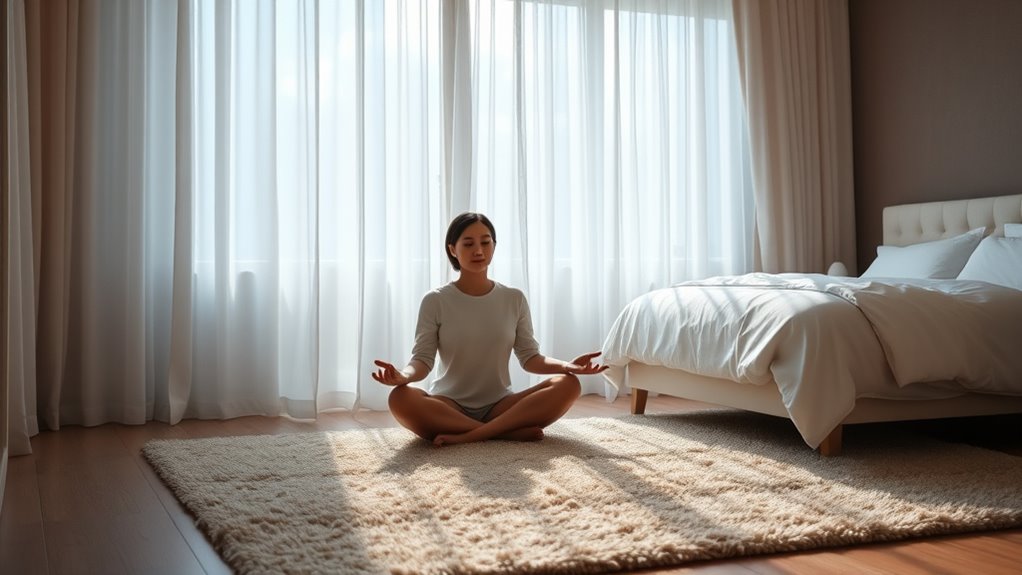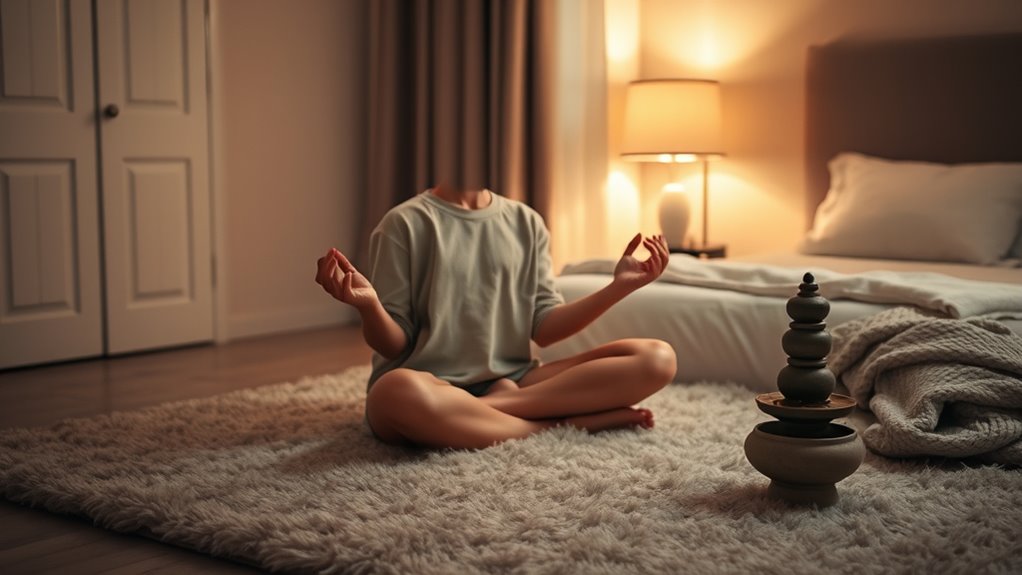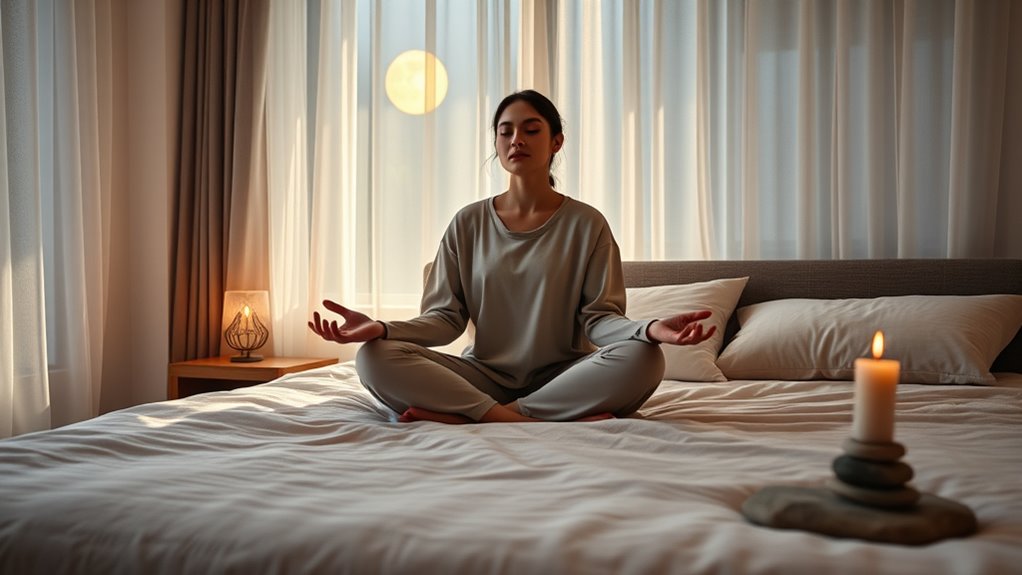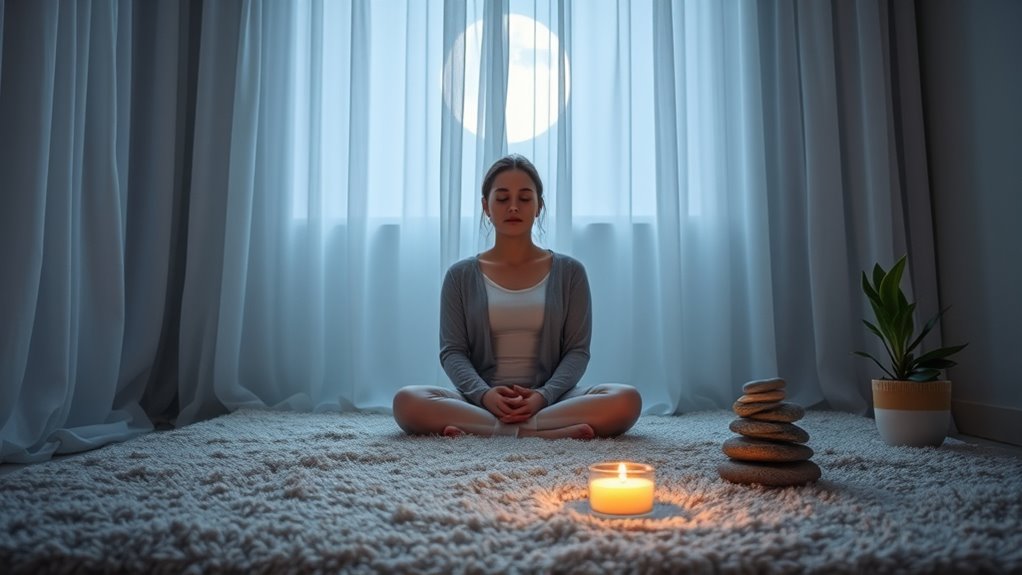Practicing mindfulness before bed can boost your sleep quality by calming your mind, reducing worries, and improving emotional regulation. Techniques like focused breathing, body scans, and observing thoughts help you stay present and ease racing thoughts. Scientific studies show mindfulness can have a large positive impact, comparable to medications or therapy, without side effects. If you’re curious about specific strategies and how to make mindfulness part of your nightly routine, explore more ways to transform your sleep experience.
Key Takeaways
- Mindfulness improves sleep quality with large effect sizes, comparable to medications and CBT, by reducing worry and promoting relaxation.
- Techniques like focused breathing, body scans, and observing thoughts help calm the mind before bed.
- Regular, brief mindfulness sessions enhance awareness of sleep cues and regulate emotions, leading to more restorative sleep.
- Mindfulness benefits those with sleep issues, chronic conditions, or high stress, especially older adults and busy individuals.
- Combining mindfulness with sleep hygiene practices offers a safe, effective approach to improving sleep and overall well-being.
Scientific Evidence Supporting Mindfulness and Sleep

Numerous studies have demonstrated that mindfulness-based programs can substantially improve sleep quality. You see, research shows that these programs have a large effect size (0.89), comparable to medications and cognitive behavioral therapy. Randomized controlled trials reveal that mindfulness meditation reduces insomnia, fatigue, and depression better than just sleep education. Meta-analyses of 18 studies involving over 1,600 participants confirm that mindfulness practices improve sleep more than education-based treatments, with effects similar to other evidence-based therapies. Additionally, mindfulness benefits extend beyond sleep, reducing daytime fatigue and depression. These positive results are consistent across age groups, including older adults with moderate sleep issues. The growing body of evidence makes it clear that mindfulness is a powerful, effective option for improving your sleep quality.
How Mindfulness Enhances Restful Nights

Mindfulness enhances restful nights by training your attention to focus on the present moment, which helps you become more aware of your body’s sleep cues. When you practice mindfulness, you notice physical sensations, emotions, and thoughts without judgment, allowing you to respond calmly rather than react with anxiety or frustration. This emotional regulation reduces bedtime worries that can keep you awake. Additionally, mindfulness improves your ability to respond promptly to sleep signals, promoting healthier sleep patterns. By calming your mind and body, you create a more conducive environment for sleep. This heightened awareness and emotional balance help break the cycle of racing thoughts and negative emotions that often interfere with falling asleep, leading to more restful, restorative nights. Incorporating mindfulness techniques into your nightly routine can further enhance your ability to achieve peaceful sleep.
Practical Techniques to Incorporate Mindfulness Before Bedtime

To effectively incorporate mindfulness into your bedtime routine, start with simple, focused techniques that help calm your mind and body. Begin with focused breathing: inhale slowly through your nose, hold for a few seconds, then exhale gently through your mouth. Repeat this for several minutes to anchor your attention and reduce racing thoughts. Next, try a body scan meditation—progressively bring awareness to each part of your body, from your toes to your head, noticing sensations without judgment. Observing thoughts and emotions without reacting can also ease bedtime anxiety. Keep your practice short—just 10 to 20 minutes—and consistent. Using guided meditations or mindfulness apps can provide structure and support, especially if you’re new to these techniques. Incorporating sound healing science techniques, such as listening to calming frequencies, can further enhance relaxation before sleep.
Who Can Benefit Most From Mindfulness Sleep Strategies

Individuals with specific sleep challenges or health conditions often see the greatest benefits from mindfulness sleep strategies. If you struggle with sleep, chronic health issues, or emotional distress, mindfulness can help improve your sleep quality and daytime functioning. Here are four groups that may benefit most:
Those with sleep issues or health concerns often gain the most from mindfulness sleep strategies.
- People with insomnia or difficulty falling asleep.
- Older adults experiencing sleep disturbances and daytime fatigue.
- Individuals managing chronic health conditions like hypertension or diabetes.
- Students or busy professionals facing stress and racing thoughts at bedtime.
Mindfulness techniques can reduce anxiety, improve emotional regulation, and promote healthier sleep patterns. Incorporating practices such as sustainable habits can also support long-term sleep health and overall well-being. Even if your sleep issues are mild, incorporating mindfulness may still enhance your overall sleep quality and well-being.
Comparing Mindfulness to Other Sleep Improvement Methods

When comparing mindfulness to other sleep improvement methods, it’s clear that each approach offers unique advantages, but they also share similar levels of effectiveness. Mindfulness’s impact on sleep quality rivals cognitive behavioral therapy (CBT) and medications, often producing large effect sizes. Unlike medication, mindfulness has minimal side effects and can improve daytime functioning, like mood and energy. Combining mindfulness with sleep hygiene practices may boost results further. Here’s a quick comparison:
| Method | Key Benefit |
|---|---|
| Mindfulness | Reduces worry, improves emotional regulation |
| CBT for Insomnia | Targets thoughts and behaviors disrupting sleep |
| Pharmacotherapy | Fast relief but potential side effects |
Additionally, mindfulness techniques can enhance color accuracy by helping individuals manage stress and promote relaxation, which are essential for quality sleep.
Frequently Asked Questions
How Long Should I Practice Mindfulness Daily for Sleep Benefits?
You should practice mindfulness for about 10 to 20 minutes daily to see sleep benefits. Regular, short sessions are effective, especially when done consistently. Focused breathing, body scans, or observing thoughts without judgment work well within this timeframe. If you’re busy, even brief daily practices can help reduce bedtime anxiety and improve sleep quality. Over time, these consistent efforts can lead to noticeable improvements in your sleep.
Can Mindfulness Help With Severe or Chronic Sleep Disorders?
Like a lighthouse guiding ships through stormy seas, mindfulness can support those with severe or chronic sleep disorders, but it’s not a cure-all. It may improve sleep quality and reduce symptoms, yet it shouldn’t replace medical treatment. You should combine mindfulness with professional care, especially for persistent issues. Your best approach involves consulting healthcare providers, using mindfulness as a helpful tool alongside other evidence-based treatments.
Are There Any Side Effects or Risks Associated With Mindfulness Meditation?
You won’t experience significant side effects from mindfulness meditation, but some people may face temporary discomfort, like increased emotional awareness or frustration when trying to focus. If you have underlying mental health issues, mindfulness might initially bring up challenging feelings. It’s important to practice gently and seek guidance if needed. Overall, mindfulness is a safe, non-invasive technique with minimal risks, especially when done consistently and correctly.
How Quickly Can I Expect to See Improvements in Sleep?
Like planting a seed in fertile soil, you might start noticing sleep improvements within just a few weeks of regular mindfulness practice. Consistent daily sessions of 10-20 minutes can gradually calm your mind’s storm, helping you drift into restful sleep more easily. While some may experience faster changes, patience is key; with time and dedication, your sleep can transform from restless nights into peaceful, restorative slumber.
Is Mindfulness Effective for Children or Teenagers With Sleep Issues?
Yes, mindfulness can be effective for children and teenagers with sleep issues. When you introduce simple practices like focused breathing or body scans, young people often experience reduced bedtime anxiety and improved sleep quality. Consistent practice, even for just 10-15 minutes daily, helps regulate emotions and attention, leading to better sleep over time. Tailoring techniques to their age and making sessions engaging increases the likelihood of seeing positive results.
Conclusion
By embracing mindfulness, you open the door to nights of deeper, more restorative sleep. Think of it as planting a seed that blooms into peaceful rest, helping your mind quiet down like a calm lake at dawn. With consistent practice, you’ll find yourself drifting off more easily and waking up refreshed. So, start today—your journey to restful nights is just a mindful moment away, turning sleep into the sweetest dreams you’ve ever had.









